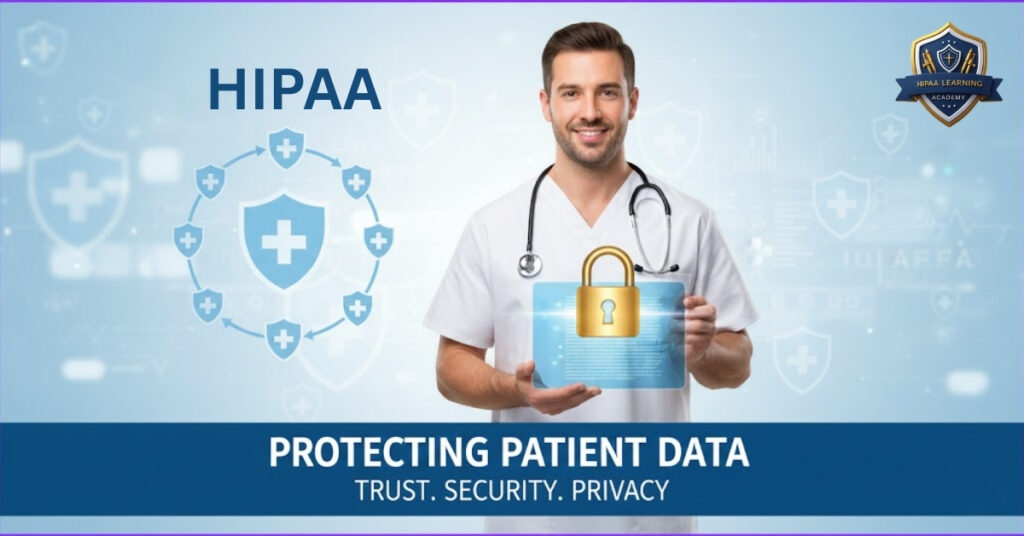First, it is important to have HIPAA certification in healthcare because it ascertains that one understands the importance of the privacy of patients and the security of data.
This is not, as such, a formality but rather a reflection of the provider’s commitment to observe ethical considerations and to abide by federal regulations.
It would be to the benefit of all levels of health professionals, from doctor to administrator, to be in compliance with the requirements of HIPAA. Certification may even advance a person’s career or professional credibility.
This would include training and testing followed by education. This also helps them to know how to protect sensitive health information.
This will act as an asset in the building of trust in the patients wherever it may be, be it New York or California. It also reduces the possibility of their having legal issues.
What is HIPAA, and why is certification so critical?
HIPAA stands for Health Insurance Portability and Accountability Act. The law setting standards that protect sensitive information related to patients was passed in the year 1996. This is quite important for healthcare providers and any other organization associated with them.
First, HIPAA is founded on the basis that a patient’s information should be private and secure; the handling or sharing of any information should even be dealt with under tighter restrictions.
No government agency requires HIPAA certification, but most employers of dental assistants do require it. This reflects initiative in learning the rules about privacy.
Certification, therefore, matters on a number of fronts: it assures commitment to protection in so far as patient data is concerned. Besides, it aids health entities in observing federal regulations and thus avoiding heavy penalties.
Key Elements of HIPAA The key elements of HIPAA are essential to any professional in the health care field. Certification on such highly important areas includes:
Patient privacy rights
Data protection protocols
Breach notification procedures
In short, HIPAA certification supports ethical and legal considerations involved in healthcare. This gives the professionals an ability to be responsible when it comes to information about patients. Certifications characterize the concern and commitment one has toward sensitive health information protection.
Who needs HIPAA certification?
Various areas associated with health professionals to which HIPAA certification applies involve workers dealing directly with information concerning patients, which may include but are not limited to doctors, nurses, and even administrative personnel. Even IT professionals working in a healthcare environment have to attain this certification as well.
Many healthcare organizations require a certified compliance officer. The compliance officer oversees the programs for the healthcare organization, including the development and implementation of policies as they relate to HIPAA. Medical law and consulting is another fast-growing area for a certified professional in HIPAA.
Certain positions that especially benefit from HIPAA certification include:
Doctors/physicians
healthcare administrators
IT professionals in health
Compliance officers
Certification provides broad-based knowledge concerning the rules of privacy and security. It helps the professional in being genuinely responsible while handling data. Finally, it adds credibility to the individual who has the HIPAA certification and opens further avenues for a career in health care.

Types of HIPAA Certification and Training
Because there is a range of levels in terms of HIPAA certification, certifications can vary between basic and advanced and tap into different areas of the HIPAA regulations. Major areas that the courses address include patient rights, data protection policy, and breach notification procedures.
The training options are highly flexible; they are available in both in-person and online formats. Because of the ease and flexibility, the demand for HIPAA online courses is very high. Professionals can learn at a time that is convenient, thus accommodating training into their busy schedules. A couple of these programs include live webinars and interactive sessions, too, which vastly improve learning from the course material by the participants.
HIPAA training and certification options include:
HIPAA Fundamentals
HIPAA Professional Certification
Certification as a HIPAA Compliance Officer
Advanced Privacy and Data Security
Each of these different certification programs focuses on distinct work roles and verifies that the trainees have acquired the necessary knowledge. A compliance officer’s certification would focus on regulatory oversight, whereas an IT professional might wait for more advanced training in data security. The appropriate type should be chosen in accordance with professional objectives and current duties, providing a route to complete mastery of HIPAA regulations.
HIPAA Training Requirements: What You Need to Know
Training is one of the major features of compliance with HIPAA. In most organizations, it equips them to handle patient information in a safe way; hence, it minimizes breaches of privacy and associated litigation.
Training may also involve annual updates and can also be designed in such a way to keep staff updated about any changes that might have taken place with regards to the regulations. The updates tend to be fairly important given that the rules under HIPAA may change, and practices around compliance also change as well. Specialized training may also be required by the different roles within the organizations.
Training will also often involve:
PATIENT’S RIGHTS AND RESPONSIBILITIES IN PRIVACY
Data protection methods and policies
Data breach reporting procedures
These training requirements ensure security of patient information and build trust within an organization. Compliance saves the health providers from expensive penalties while preserving the best practices of their profession.

